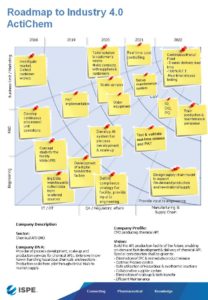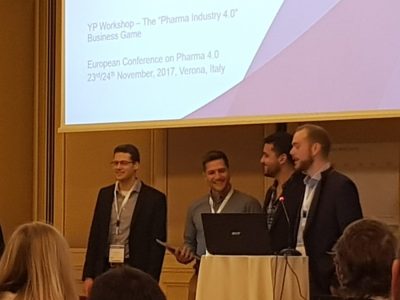ISPE Pharma 4.0 Conference in Verona
ISPE Pharma 4.0 Conference in Verona
Verona. Participants from 19 countries met at the Villa Quaranta Hotel in Verona, Italy, to learn more about the challenges and opportunities of Pharma 4.0. The conference was organized by the Italy Affiliate in collaboration with the Special Interest Group (SIG) “From Industry 4.0 to Pharma 4.0”. Representatives from ISPE working groups and innovation leaders in pharmaceutical companies, CMO’s, supplier companies, consulting firms and from academia offered valuable input in their presentations. The main topics of the conference were end-to-end integration, data integrity and analytics, automation and the working world of the future. Visitors were able to expand their network and discuss their ideas with colleagues and specialists.
The conference opened on Thursday morning with keynote sessions. Uli Kuchenbrod (Vetter Pharma) presented the Pharma 4.0 Maturity Model, which is being developed by the Pharma 4.0 SIG and which allows companies to evaluate their current state on the road to Pharma 4.0 and to determine their next steps. Christian Wölbeling spoke about the “Holistic Manufacturing Control Strategy”, which is intended to lay the foundation for tomorrow’s pharmaceutical production. Alistair Orchard, Vice President Digital Enterprise at Siemens, provided inspiration from the non-pharmaceutical Industry 4.0 world. He illustrated the urgency with which Siemens is driving development toward new technologies and business models. The company recognized several years ago that insisting on proven business models could possibly mean bankruptcy and subsequently invested several billion US dollars in new technologies and products. As exemplary results of these efforts, Alistair demonstrated an automated machine parts development process based on artificial intelligence. Today, the company is also able to use a “digital twin” to simulate complete production lines down to the smallest detail even before the plants are built.
After this general introduction, the program was split into two tracks, between which the participants had to decide: “Quality & Predictive Control” and “Automation & Industry 4.0 Enabling Technologies”. Oliver Ingold, representing the YP DACH Group, was co-chair of the “Quality & Predictive Control” track. The presentations by Francesco Mina (Janssen) and Stefano Gelsomini (LivaNova) each showed successful examples of the use of PAT technology for process control and real-time release testing. At Janssen, initial trials are also underway in the area of model-predective control. Matthias Arnold (External Consultant Digital Enterprise at Eppendorf) spoke about the deeper networking of laboratory equipment. This approach is exciting because, thanks to the introduction of continuous manufacturing and smaller batch sizes (keyword personalized medicine), the use of laboratory equipment for production could also soon become a reality. Nuala Calnan’s presentation on corporate and quality culture was also very interesting. It showed that the quality culture in production plants can be measured using various indicators (for example, CAPA effectiveness or number of improvement suggestions from employees). It also clearly demonstrated that plants with a strong quality culture and high process stability are significantly more reliable in delivering product of the required quality. Nuala is co-leader of the ISPE Quality Culture Team, which recently published the Quality Culture Report (free download for ISPE members). Finally, Robert Gärtner, Director of Quality at Veeva, demonstrated the benefits of cloud solutions for quality-related systems such as QMS, DMS and LIMS. While data analytics is already being performed in the cloud today (including release by exception), predictive analytics using artificial intelligence could also be possible in the future.
In addition to Oliver Ingold, three other Emerging Leaders were involved in the conference as Co-Chairs: Frederico Poli (Italy), Juan José Alba Gil (Spain) and Abdelghani Meqdad (France). The four YPs had worked together to put on a half-hour workshop as part of the Workforce of the Future track.
The concept of the workshop worked as follows: The goal was to develop a roadmap to Pharma 4.0 for four different scenarios of fictitious companies. Participants were divided into teams of 7 and each team had one of the four case studies to complete. Each participant was assigned one of seven roles in a company: Engineering, Business Unit/Marketing, QA/Regulatory Affairs, IT/OT, Manufacturing & Supply Chain, R&D, and Transition Manager. The task of the first 6 roles was to fill the roadmap template with concrete ideas (Post-It). The Transition Manager was responsible for coordinating the 6 departments.
The participants showed very good teamwork skills and worked efficiently. Despite time pressure (in the end, only about 15 minutes remained for completing the task), interesting solutions and coherent roadmaps for their implementation were developed. The result for the fictitious company DermaCare is explored in more detail in an article in Pharmaceutical Engineering magazine (March-April 2018 issue).

for the fictitious CMO ActiChem.

Federico Poli, Abdelghani Meqdad,
Juan José Alba Gil and Oliver Ingold